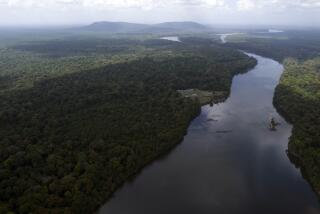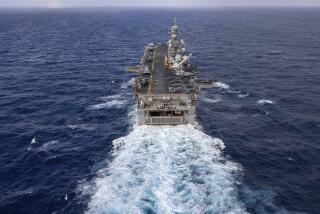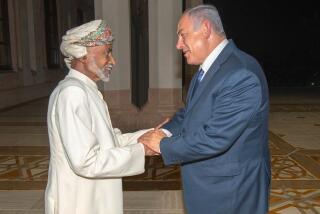Won’t Allow Foreign Bases, Kuwait Says
- Share via
WASHINGTON — Kuwait said Saturday that it will not allow the United States or any other foreign power to establish military facilities on its territory, apparently ruling out the use of Kuwaiti airfields for U.S. warplanes providing air cover to U.S. Navy ships operating in the Persian Gulf.
Nevertheless, there was growing evidence that, in seeking U.S. and Soviet protection for ships carrying oil from the tiny emirate, Kuwait hopes to elevate the role of the superpowers in the Iran-Iraq War and preclude an ultimate Iranian victory.
“Kuwait has not considered, in any form, granting facilities or concluding any agreements or allowing the establishment of military bases on its territory,” the Kuwaiti foreign minister, Sheik Sabah al Ahmed al Sabah, told his country’s official KUNA news agency.
The United States and Kuwait are completing technical arrangements to place 11 Kuwaiti tankers--half of that country’s oil-carrying fleet--under the U.S. flag to afford them the protection of U.S. warships. Although no schedule has been announced, the first Kuwaiti tanker to fly the U.S. flag is expected to leave port later this month.
U.S. officials have said that any sizable naval operation to protect gulf shipping would require air cover. Warplanes from aircraft carriers operating outside the gulf could provide the air support, but Secretary of State George P. Shultz said recently that the operation would be more effective and less expensive if undertaken from bases on land.
Kuwait earlier chartered three Soviet-owned tankers, which have begun to carry Kuwaiti oil under the protection of Soviet naval ships. According to diplomatic sources in Bahrain, quoted by the Associated Press, the Soviet Union has made a verbal commitment to provide more ships if the U.S.-Kuwait deal falls through.
Sabah, leaving Kuwait for Saudi Arabia where he will attend a meeting of the Gulf Cooperation Council, said the security of gulf shipping “requires international safeguards.”
Subtle Diplomacy
It was a typical balancing act for Kuwait, an economically rich but militarily weak principality that relies on subtle diplomacy to protect its security and wealth.
The Kuwaitis want the support and good will of both superpowers without allowing either one to gain much influence in the 6,800-square-mile city-state, which has a population of about 1.7 million, of whom only about 700,000 are Kuwaiti citizens. (The rest are mostly other Arabs, Iranians, Indians and Pakistanis who form the nation’s labor pool.)
Kuwait sought U.S. and Soviet protection earlier this year, although the pace of the so-called “tanker war” in the gulf was little changed from the situation two or three years ago, according to non-government experts in Washington. Both Iran and Iraq have attacked commercial ships in the gulf during the war.
The Washington experts speculate that Kuwait, operating with the tacit approval of Saudi Arabia and other gulf Arab states, is far more worried about the possibility that Iran might win the war with Iraq than about relatively small losses of shipping to Iranian attacks.
Although Iran might bluster about superpower involvement, the Tehran regime would be expected to take care to avoid an overt confrontation with either Washington or Moscow, the experts said.
‘Real Concern’
“The real concern is that Iran will become the dominant military force in the gulf,” William B. Quandt, a former National Security Council staff member, said recently. “They (the Arabs) want us and the Soviets to see that that doesn’t happen.”
Quandt, now a fellow of the Brookings Institution in Washington, said Kuwait seems to have achieved its objective of bringing both Washington and Moscow into the picture.
More to Read
Sign up for Essential California
The most important California stories and recommendations in your inbox every morning.
You may occasionally receive promotional content from the Los Angeles Times.













